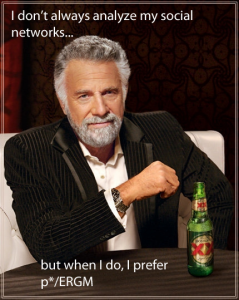Noshir Contractor presented Using Multi-theoretical Multilevel Models to Understand and Enable Communities at the Workshop on Network Science in Electrical Engineering and Computer Science at the Indian Institute of Science in Bangalore, India, on January 11th, 2012. This workshop is part of a special year on network science organized by the Indian Institute of Science Mathematics Initiative in conjunction with the International Centre for Theoretical Sciences at the Tata Institute for Fundamental Research, Mumbai. For more information, see: http://www.icts.res.in/
The World’s Most Interesting Man on Social Network Analysis
Contractor featured in WLS-TV report on social media implication
Noshir Contractor was featured on Chicago’s ABC affiliate WLS-TV in a story titled “Canine Connections” about using social media to support local community efforts such as finding lost dogs. See http://bit.ly/noshwls-tv
World 27% Smaller Than 1967
…as Facebook has grown over the years, representing an ever larger fraction of the global population, it has become steadily more connected. The average distance in 2008 was 5.28 hops, while now it is 4.74.
Wikipedia Work Featured on PBS Idea Lab
Our Wikisym paper on the dynamics and structure of Wikipedia’s coverage of the 2011 Japanese earthquake was featured in a blog post at the PBS Idea Lab.
Contractor to present at Chicago Humanities Festival
Contractor presented “Traces in a Tangled Web” on October 16 at the Chicago Humanities Festival. For more information follow the link: http://www.chicagohumanities.org/en/Profile/Bio.aspx?userid=24eddb81-05b3-4cbf-b95c-79a9d00a8d69
Contractor to deliver keynote at SocInfo’11 Oct. 7
 SONIC lab director Noshir Contractor will be giving a keynote address on October 7th titled Using Web Science to Understand and Enable 21st Centuryy Multidimensional Networks at the 3rd International Conference on Social Informatics (SocInfo’11) in Singapore.
SONIC lab director Noshir Contractor will be giving a keynote address on October 7th titled Using Web Science to Understand and Enable 21st Centuryy Multidimensional Networks at the 3rd International Conference on Social Informatics (SocInfo’11) in Singapore.
For more details go to http://www.sis.smu.edu.sg/SocInfo2011/index.html
Contractor to present at Workshop at NYU
 SONIC lab Director Noshir Contractor will be presenting Friday, September 30th, at the Workshop on Information in Networks (WIN) at New York University’s Stern School of Business.
SONIC lab Director Noshir Contractor will be presenting Friday, September 30th, at the Workshop on Information in Networks (WIN) at New York University’s Stern School of Business.
The title of Contractor’s presentation will is “Using Web Science to Understand and Enable 21st Century Networks”.
For more details on this workshop, go to http://winworkshop.net/index.php.
Six Provocations for Big Data
Paper by danah boyd of Microsoft Research and Kate Crawford of the University of New South Wales, presented at Oxford Internet Institute’s “A Decade in Internet Time: Symposium on the Dynamics of the Internet and Society” on September 21, 2011. Here’s a sample of two of the six provocations:
“The current ecosystem around Big Data creates a new kind of digital divide: the Big Data rich and the Big Data poor.”
“How can students be educated so that they are equally comfortable with algorithms and data analysis as well as with social analysis and theory?”
Networks of Surnames
 You can build networks out of even the most everyday objects! Scientists at the University College London and University of Auckland published a study in PLoS ONE using telephone directories and electoral registers in 17 countries to build two-mode networks linking given names to surnames. When these graphs are projected into a one-mode network, they reveal interesting cultural and ethnic community structures about how surnames are linked to each other by common given names. The graph at right, for example, includes distinct clusters of South Asian\Indian, Tongan, Samoan and other Pacific Islander, and Eastern European names in New Zealand. The structure of this network suggests that socio-cultural naming practices reproduce themselves in diasporic communities but globalization is also driving interesting and emergent “mashups”. source: ScienceDaily
You can build networks out of even the most everyday objects! Scientists at the University College London and University of Auckland published a study in PLoS ONE using telephone directories and electoral registers in 17 countries to build two-mode networks linking given names to surnames. When these graphs are projected into a one-mode network, they reveal interesting cultural and ethnic community structures about how surnames are linked to each other by common given names. The graph at right, for example, includes distinct clusters of South Asian\Indian, Tongan, Samoan and other Pacific Islander, and Eastern European names in New Zealand. The structure of this network suggests that socio-cultural naming practices reproduce themselves in diasporic communities but globalization is also driving interesting and emergent “mashups”. source: ScienceDaily

